The Bank of England today increased its base rate by 75 basis points from 2.25% to 3%, one of the biggest increases seen for 30 years.
The Monetary Policy Committee voted 7-2 to increase the rate to its highest level since 2008.
The move is intended to curb inflation which is over 10%.
The rise is the biggest one month rise since 1989. One year ago the base rate was just 0.1%.
Mortgage rates are expected to rise significantly as a result of today's increase and cash savings rates are likely to rise too.
The 75 basis point rise was widely expected by markets and experts.
The current rate of CPI inflation is 10.1%, a 40 year high, and has been rising rapidly. The target remains 2%.
A number of central banks around the world have been raising rates recently. In the US the Fed yesterday announced a rise in interest rates by 0.75 percentage points to a benchmark lending rate of 3.75% to 4%, the highest level seen since 2008.
David Goebel, associate director of Investment Strategy at wealth manager Evelyn Partners, said: "Markets had been pricing in continued rate hikes up to as much as 5.25% next year, but the Bank made clear in its statement today that this was not a likely path, saying that the peak in rates will be, “lower than priced into financial markets”.
"It forecast that following the market path would result in a long recession – two years from Q3 2022 to Q3 2024 - and reducing inflation to near-zero, far below the Bank’s 2% target. This implies that the peak for bank rate will be below 5.0%.
"For market-watchers and investors, a divergence between the rhetoric from the US Federal Reserve at their meeting yesterday and that from the Bank’s today can be observed. Fed Chair Jerome Powell warned markets not to underestimate the likely path of interest rates while the MPC effectively implied the opposite about UK rates. This has resulted in GBP weakness in the market today and could continue to have that effect in the short term."
George Lagarias, chief economist at Financial Planners and accountants Mazars, said: “As expected, the Bank of England proceeded with a triple rate hike, matching the US Central Bank’s fervour and focus on beating inflation. Yet the UK economy is forecast to be one of the weakest in Europe. The forthcoming budget is already set to be a difficult one for consumers. Hiking rates so sharply is a risky move for a slowing economy which is already projected to go into recession next year.”
Kirsty Watson, chief operating officer, adviser at abrdn, said: “This latest base rate hike will put even greater pressure on clients’ expenditure and could impact their appetite for investment. And with the Chancellor ending universal energy support from next April and high inflation predicted to persist into next year, there is no respite in sight.
“Against this backdrop, advisers need to be prepared to answer urgent questions and support clients with the practical support and the reassurance they need. Ensuring that clients continue to take a long-term view, avoiding potentially damaging short-term reactions, and maintain the right balance of investments for their financial goals will be key.”
Sarah Coles, senior personal finance analyst, Hargreaves Lansdown, said: “The Bank of England threw a black cloud over the UK economy today, shrouding it in gloom. It warned that we’re set for a miserable recession throughout next year and the first half of 2024. While this will dampen inflation, it will also pour a bucket of cold water on the labour market, so after such a long period of our wages falling behind inflation, we run the risk of losing those wages altogether.
"For savers this adds insult to injury, because on top of all of their economic woes, they know that rising savings rates aren’t necessarily going to last. The small sliver of good news comes for borrowers – who might not see mortgage rates rise as high as they feared. The Bank currently forecasts that interest rates will rise to 5.2% in late 2023, before starting to fall back.
"The pain of inflation isn’t over yet. The Bank now expects it to be 11% in the last three months of this year, before dropping back from early 2023 as previous energy price hikes drop out of the calculations."
Derrick Dunne, CEO of YOU Asset Management, said: “The biggest interest rate hike in 33 years just shows how hard the Bank of England is working to get inflation down, particularly in the wake of Liz Truss and Kwasi Kwarteng’s Mini Budget and the change in Government. Households were already under pressure from extra costs like increased mortgage rates and inflation and this decision is going to squeeze them even harder."
Richard Ollive, senior financial adviser at Wesleyan, said: “We haven’t seen a Bank Rate hike this big since the 1980s. This should be good news for savers, but so far banks have dragged their feet when it comes to passing better interest rates on to consumers, though we’ve seen variable rate mortgages go up almost instantly. So, the biggest impact of today’s announcement will fall on those with debts, including mortgages."

